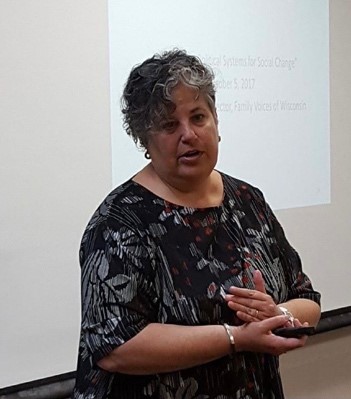Administration Issues Proposed “Public Charge” Rule
For many months it has been expected that the administration would issue a rule redefining what it means to be a “public charge” for purposes of deciding which immigrants should be allowed to enter or stay in the United States. The proposed rule was finally released on Saturday night (9/22) with a press release from the Department of Homeland Security (DHS). In the coming days it will be available for public inspection online, and will be published in the Federal Register within about a week. At that point, a 60-day public-comment period will begin.
Immigration law has long included the concept of “public charge,” with the intent of excluding immigrants likely to become a burden on the government. In making a determination about whether someone might become a public charge, immigration officials consider the totality of the circumstances, including receipt of specified public benefits. Under current law and regulations, these are limited to cash assistance — such as Supplemental Security Income (SSI), Temporary Assistance for Needy Families (TANF), and comparable state or local programs – and government-funded long-term institutional care.
The proposed rule would significantly expand the government supports that could be considered in public-charge determinations only for certain individuals – those seeking to enter the U.S. and immigrants applying for a green card or certain other changes in immigration status. It would not affect deportation decisions.
As summarized by the group Protecting Immigrant Families/Advancing Our Future, the benefits that would be considered in public-charge determinations under the proposed rule are:
- Medicaid, with limited exceptions:
- Services to treat an “emergency medical condition”
- Certain disability services related to education (IDEA)
- Benefits received by children of US citizens who will be automatically eligible to become citizens (including children adopted from other countries, even if they have special health care needs)
- Benefits for children entering the country primarily to attend an interview under the Child Citizenship Act of 2000
- Supplemental Nutrition Assistance Program (SNAP);
- Medicare Part D Low Income Subsidy; and
- Housing assistance, such as public housing or Section 8 housing vouchers and rental assistance
Immigration officials would be able to look back for 36 months to see whether a visa or green-card applicant has used any of these benefits, but could not look at benefits received prior to the effective date of the final rule.
The proposed rule specifically excludes certain benefits from public-charge determinations, including: disaster relief, emergency medical assistance, public health assistance for immunizations, and for testing and treatment of communicable diseases, benefits received by an immigrant’s family members, or entirely state, local, or tribal programs other than those specifically listed. Benefits not listed, such as education, child development, employment, and job training programs would also be excluded.
Notably, the proposed rule does not include the Children’s Health Insurance Program (CHIP) among the benefits that could be considered in public-charge determinations, but the Department asks for comments on whether it should be. Nor does it include consideration of subsidies for health insurance under the Affordable Care Act (ACA). Some earlier leaked drafts would have allowed consideration of CHIP and ACA benefits.
As noted above, the proposed rule would not allow benefits received by family members to be considered in determining whether an immigrant might become a public charge. Therefore, it should not hurt an immigrant seeking entry to the U.S. or applying for a green card or other change in status if his or her child is on Medicaid. Receipt of Medicaid benefits by an adult or child him- or herself will be considered in assessing that person’s likelihood of becoming a public charge, with the exceptions noted above – emergency care, services provided under the Individuals with Disabilities Education Act (IDEA), and benefits provided to children of parents of U.S. citizens who will automatically become citizens.
The National Academy for State Health Policy (NASHP) notes that states may want, or be perhaps be legally required, to disclose the potential consequences for immigration determinations to individuals applying for Medicaid and other public programs.
DHS estimates that the proposed changes will directly affect approximately 382,000 individuals annually. In actuality, however, children and other family members will be affected as well if their immigrant relatives are dissuaded from taking housing assistance, food stamps, or other benefits that would be shared by the family. In addition, fear and confusion will lead (and already has led) to people deciding not to apply for benefits, even for citizen children, when there is an immigrant family member.
For more information see:
- Proposed Changes to Public Charge: Quick Analysis (Protecting Immigrant Families/Advancing Our Future)
- Federal Proposal Broadens “Public Charge” Definition for Immigrants: What Are the Implications for States? (National Academy for State Health Policy)
- 5 Things to Know About Trump’s New ‘Public Charge’ Immigration Proposal (Kaiser Health News)
- Trump Administration Seeks to Limit Access to US for Immigrants Who Use or are Likely to Use Public Assistance (Washington Post)
Proposed Rule Related to Detention of Children (Flores Settlement)
Under a court settlement – the “Flores settlement”— the government must release children from custody without delay, and when release is not possible, they must be held in the least restrictive setting, typically a non-secure facility licensed by a child welfare entity. If children are detained with their parents in family detention centers that do not meet this standard, they must be released within 20 days. By its terms, the settlement will no longer be effective if the government issues rules to implement its holding. Since the administration wants to hold parents seeking to immigrate for longer than 20 days, and (pursuant to another court order) can no longer separate parents and children, it is seeking to adjust the 20-day limit via regulation. This situation is explained in a Sept. 18 blog post from the Georgetown Center on Children and Families (CCF): Proposed Rule Would Make Matters Worse for Immigrant Children Held in Detention – Comments Due Nov. 6.


















